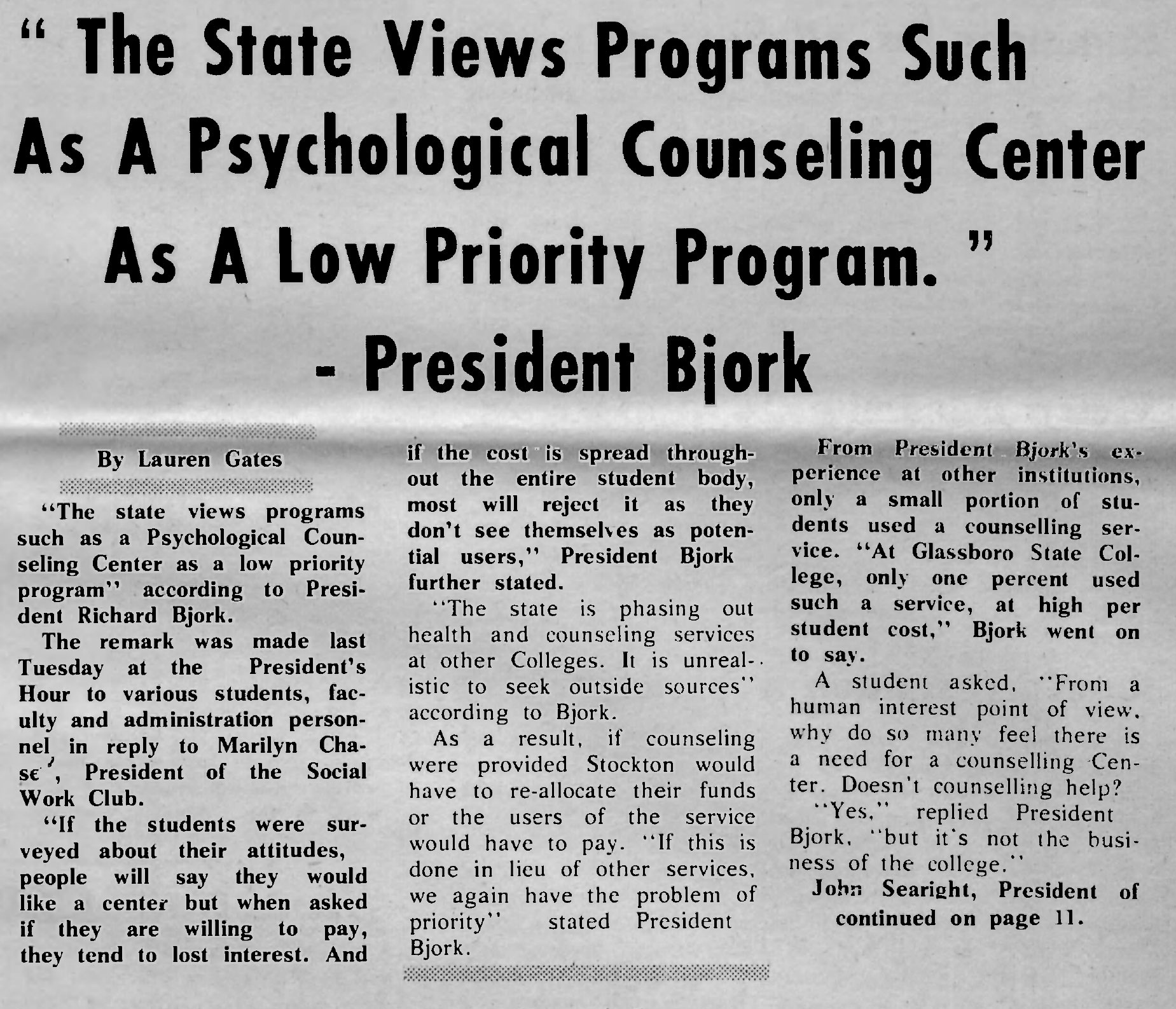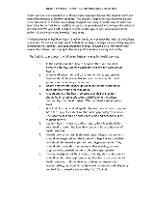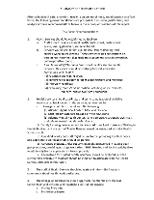Counseling and Health Services: An Early Stockton Controversy
By John Searight
Background
Very early in its history Stockton University established a position on Health Services. The Board of Trustees and the College administration decided there would be no direct provision of medical and counseling services to the student body. The Self Study Report (1975) for our initial accreditation by the Middle States Commission on Higher Education states,
Stockton’s student life policies are derived from the commitment to treating students as adults with the right and responsibility to manage their own affairs.… Students are expected to manage their own personal lives without college supervision or financial support.… These policies have afforded students experience in managing their own affairs.… They have also militated against the establishment of college-supported counseling and medical service. (12)
Additional justification was set forth in an earlier report (1974) prepared by the college president’s office prior to the accrediting team’s visit.
The college accepts students as legal adult citizens and endeavors to treat them as
such in all respects. The costs of such activities as health services and psychological
counseling should not be placed on the general taxpayer and students should find and
pay for such services in ways followed by other adults. The student life environment
should emphasize self-discipline, self-reliance, individual initiative, and individual responsibility for choices, and personal responsibility for meeting obligations.(Emphasis added; 7).
The 1973–74 Stockton State College Bulletin states in the section “Special Services”:
Health Services. Stockton does not provide on-campus health services or care generally associated with an infirmary or clinic. As citizens, students will utilize the health services of the surrounding communities. These include two excellent hospitals and a full range of medical offices. If exceptional medical facilities and services are required, Philadelphia is about an hour away. (66)
A review of archival material in the university library has provided documentation that there was a very early concern expressed about the lack of student counseling and health services on campus. In 1971 several faculty and staff sent a report expressing concerns about the need for student services to the college president, Dr. Richard E. Bjork. A memo “Counseling Services” from the Office of Special Services was received by faculty and staff on November 2, 1971. President Bjork announced that he had appointed two “Clinical Associates,” one to provide counseling and one to provide crisis intervention. The services were in Atlantic City and Margate, and students were expected to pay modest fees. By the end of the 1971–72 academic year there had been very little use of these services and they were discontinued.

Questions Arise
In the September 20, 1973, issue of The Argo, Professor Tony Marino in a Faculty Corner article urged Stockton to begin providing counseling services for students. Several faculty in the Division of Social and Behavioral Sciences lamented the lack of counseling, with one senior professor saying in a resigned manner, “We just will have to wait for our first suicide before they (the administration) will do anything.” Students began to raise the issue at regularly scheduled President’s Hours, attended by many faculty and students. Members of the Social Work Club organized a volunteer Referral Center, providing students with literature and lists and phone numbers of clinics and social agencies like Family Service Association, Atlantic Mental Health Center, and Psychiatric Emergency services at local hospitals. The college provided a phone and office space (The Argo vol. 16, no. 9).
The Self Study for Middle States Accreditation Addresses the Issue
Stockton’s 1975 Self-Study Report to Middle States states:
Our data indicate that the medical and counseling services available in the local community are inadequate to meet the needs of Stockton’s students. We take the need for adequate medical care to be a given. We are also persuaded that the resolution of some of the personal problems characteristic of college-age youth is a necessary prerequisite to learning, particularly at a college which expects students to structure their own education. (179)
The Middle States Association Evaluation Team Report (1975) agreed with this conclusion, stating “We support your findings, and recommend that you institute a program that will lead to the immediate consideration of how to best implement an improved Counseling and Health Service program” (emphasis added). Unfortunately State fiscal problems, budget crises, and threatened program cutbacks intervened, and the college’s collective energies were diverted. However, over the next two years, many students, faculty, and student organizations (Psychology and Social Work clubs) continued to raise the counseling and health services issue and organized information sessions and eventually petition drives advocating for a counseling center and a health services clinic.
Signs of Progress
At the March 1, 1977, President’s Hour, students from the Social Work Club, the Psychology Club, the Student Union, and the Concerned Students for a Counseling Center (CSCS) asked President Bjork if he would consider a proposal to expand the volunteer referral services to students in need of counseling. A robust, respectful give and take ensued, and the session resulted in media coverage by the Stockton Chronicle (vol. 5, no. 24), The Argo (vol. 17, no. 5, no. 6), and The Press of Atlantic City (March 17, 1977, 41). Copies of these articles can be found in the Stockton University Archives. I was present and a participant in this meeting and believe it was a significant and positive event in the effort to move forward.
In September 1977 Stockton agreed to provide space in G-Wing for staff from the Atlantic
City Medical Center Family Planning Services to see students for counseling. In 1978
the ACMC Family Planning Services established a full-service clinic at Scott House,
a building on campus on Jimmie Leeds Road. Students were seen each Friday of the month
from 9:00 am to 5:00 pm. Increase in demand resulted in expanding the times to include
the first and third Tuesday of each month. By the end of the year, Family Planning
medical services were provided to approximately 400 students, resulting in 900 visits.
The medical services provided were comprehensive, and an additional 243 students were
seen in the G-Wing office for advice and counseling (Report of the Task Force on Health Services, May 16, 1979, 37–39).
Transition
In the summer of 1978, President Bjork announced his resignation and his acceptance
of the offer to become Chancellor of the State College System in Vermont. On October
30, James R. Judy, Vice President for Educational Services, became Acting President
of Stockton.
A Major Step Forward
In November 1978, Acting President Judy appointed a Task Force on Health Services. Appointed were faculty from the programs of Basic Studies, Biology, Environmental Studies, Nursing, Psychology, and Social Work; staff from Campus Programs, Career Planning, Institutional Studies, and Administration and Finance; students majoring in Biology, Nursing, and Social Work. I was named Chair.
At our initial meeting on November 30, 1978, Acting President Judy provided the following charge:
- Conceptualize health services to include physical-medical and social-psychological services.
- Assess the health needs of the Stockton community and propose services only if they are justified by the needs assessment.
- Examine the scope of potential health services, how they might be implemented, and how they might interrelate with academic and non-academic programs at Stockton.
- Receive as broad an input as possible from diverse elements in the Stockton community. This should include an extensive survey of the student body and the faculty and staff as well as publicizing preliminary findings and recommendations and holding open meetings for discussion and input.
- Report findings and recommendations to Mr. Judy by May 1, 1979. (Report of the Task Force on Health Services, May 16, 1979, 3). A copy of the complete Task Force Report is available in the University Archives.
Two important sections of the Task Force Report are included below. The entire Report and Appendix, including surveys, needs assessments, data, and analyses are preserved in the University archives.
Moving from Recommendations to Establish Health Services and a Counseling Center
The Task Force on Health Services submitted its report May 16, 1979. Peter M. Mitchell
became Stockton’s second installed president on May 23, 1979. Progress on health services
and counseling slowed as the senior administrative staff and the new president became
acquainted and began planning for the new academic year. Faculty and the administration
became very involved in developing a plan to change the leadership position of the
five academic divisions from appointed deans to elected chairpersons. A modest part-time
Health Services Office in F-206 was established in 1980 and staffed with a part time
physician, a nurse, and a receptionist. It was open daily from 9 to 5 and the physician
was there on Tuesday and Thursday from 9 to 4. In the 1980–81 academic year 3,475 patient visits were recorded. In 1981–82 there were 4,245 patient visits, a 22% increase.
On October 8, 1981, the faculties of Psychology, Sociology, and Social Work received a memorandum from the Office of Student Services announcing that they, in cooperation with the Division of Social and Behavioral Sciences, were initiating “a one semester pilot project on Mental Health . . . to be implemented in January 1982.” They proposed that a faculty member be named as a Mental Health Consultant for one semester with the compensation of release time from one course. The consultant was expected to have 8 to 12 hours a week available to see students in need of evaluation and counseling. I was selected for the position. It was decided not to publicize my availability to students, but to inform faculty and staff. This was because of my limited hours. The Health Services Clinic made a number of referrals as did several faculty and many staff from student services.
By the end of the semester it was apparent that the need for services was significant, and the following year an additional mental health consultant was appointed, and our release time was increased. I was able to add two MSW interns from the Rutgers University Graduate School of Social Work. We had many students utilizing our services. We did crisis intervention and assessments and many referrals were made to community agencies for therapy and treatment. We also provided short term (4 to 6 weeks) counseling for a large number of students and extended counseling for a smaller number. Our available hours were fully utilized, and it became increasingly clear that a dedicated staff and space were needed for a Director of Counseling and a Center.
The 1984–86 Stockton Bulletin still had Health Services/Mental Health described as utilizing mental health consultants, but in 1986 a Director of Counseling
and a staff member were hired. And finally, the 1988–90 Stockton Bulletin, under Special Programs, listed the Counseling Center with a location (J-104) and
Hours (M-Th 8:30 am to 9:00 pm. Fridays 8:30 am to 5:00 pm).
The 1988–90 Bulletin describes the Center as follows:
. . . staffed by a team of counseling psychologists, a social worker, and a part-time
counselor. At the initial appointment, the student and the counselor decide which
resources currently available at the Center, at other campus offices, and/or in the
community are best suited to helping with particular concerns.
In addition to counseling services, Counseling Center Staff serve as consultants to members of the college community regarding student development and mental health issues on campus. The Counseling Center actively promotes community education and awareness through psycho-educational workshops and primary prevention programs. Services are available free of charge to all students enrolled at Stockton State College (emphasis added). The Counseling Center adheres to the ethical codes of the American Psychological Association and the National Association of Social Workers. Consistent with these ethical guidelines, counseling services are strictly confidential. (Stockton Bulletin 1998–90, 23)
Final Thoughts
It was a seventeen-year journey to evolve from the “rugged individualism” of students as adults (“with the right and responsibility to manage their own affairs . . . without college supervision or financial support . . . costs of such activities as health services and psychological counseling should not be placed on the general taxpayer and students should find and pay for such services in ways followed by other adults”) to Stockton providing health services and a counseling center free of charge to all enrolled students. In going through the documents, reports, meetings, protests, and proposals I was struck by the stark differences among the participants. President Bjork and the founding trustees had a clear rationale for their position, but gradually softened that position and President Bjork engaged in a mutual process with concerned faculty, staff, and students that resulted in a slow but steady shift to consider the needs of college-age students in a more traditional way. Interim President James Judy deserves significant recognition for setting in motion the process that finally resulted in the University having health services and a counseling center, available and free of charge to all students. It is a wonderful part of his legacy. And now, three decades later, Stockton University has an established, funded, professionally staffed, multifaceted Wellness Center.
Links to their web pages below:
Wellness Center - Health Services
Wellness Center - Counseling Center
Addendum
Copies of the following reports and news articles from The Argo, Stockton Chronicle, and Press of Atlantic City are available in the Stockton University Archives. For more information, please contact Heather.Perez@stockton.edu.
Report of the Task Force on Health Services, May 16, 1979
“Referral Center: A Source of Help,” The Argo, November 30, 1976
1973: “Faculty Corner” Urges Counseling Center. 1977: “Counseling Needs Face Old Enmity,” The Argo, February 28, 1977
“Counseling Petitions Start to Circulate,” The Argo, March 7, 1977
“Students, Faculty React to President On Counseling Needs,” The Argo, March 14, 1977
“Students/Searight Propose Counseling Center,” Stockton Chronicle, March 14, 1977
“Stockton Split on Counseling,” The Press of Atlantic City, March 17, 1977
“Bjork Accepts Vermont Post,” The Argo, April 14, 1978
“Trustees Reopen Search for New President,” Stockton Chronicle, October 16, 1978
“Health Services At Last,” The Argo, December 15, 1978
“Health Services Task Force Seeks Input,” Stockton Chronicle, May 7, 1979







